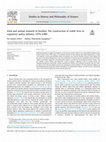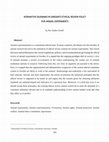Publications by Per-Anders Svärd

Studies in History and Philosophy of Science Part A, 2021
Following demands to regulate biomedicine in the postwar period, Sweden saw several political deb... more Following demands to regulate biomedicine in the postwar period, Sweden saw several political debates about research ethics in the 1970s. Many of the debates centered on fetal research and animal experiments. At stake were questions of moral permissibility, public transparency, and scientific freedom. However, these debates did not only reveal ethical disagreement-they also contributed to constructing new boundaries between life-forms. Taking a post-Marxist approach to discursive policy analysis, we argue that the meaning of both the "human" and the "animal" in these debates was shaped by a need to manage a legitimacy crisis for medical science. By analyzing Swedish government bills, motions, parliamentary debates, and committee memorials from the 1970s, we map out how fetal and animal research were constituted as policy problems. We place particular emphasis on the problematization of fetal and animal vulnerability. By comparing the debates, we trace out how a particular vision of the ideal life defined the human-animal distinction.
Journal of Animal Ethics, 2020
Boréus, K. & Bergström, G. (2018). Textens mening och makt. Metodbok i samhällsvetenskaplig text- och diskursanalys. Lund: Studentlitteratur., 2018

Global Journal of Animal Law, 2017
Animal experimentation is a contentious ethical issue. In many countries, the debate over the mor... more Animal experimentation is a contentious ethical issue. In many countries, the debate over the morality of animal research has led to the institution of ethical review systems for animal experiments. This article discusses and problematizes the current regulations, policies, and recommendations governing the ethical review of animal experiments in Sweden. It is argued that the ongoing paradigm shift in society's view of animals prompts a serious re-evaluation of the values underpinning the routine use of sentient nonhuman animals in research. Following from this, two lines of argument are pursued in the article. First, it is argued that the organizational and administrative exigencies of the current ethical committee system in Sweden are likely to work to the animals' disadvantage and undermine a fair assessment of their interests. Second, and more importantly, the article reconstructs the utilitarian principles that the ethical review is supposed to be based on and argues that the reasons given for choosing utilitarian standards are underdeveloped and indicative of a speciesist bias. Moreover, it is held that even if we should accept these principles, the existing ethical review system would fail to meet the demands of a consistent utilitarian calculus due to its outdated understanding of how animal models work and what they allow us to predict.
C. Mouffe, Agonistik – texter om att tänka världen politiskt., 2016
1. Se Wilhelm Reich, »Ur Fascismens masspsykologi. Ideologin som materiellt våld«, i Psykoanalys ... more 1. Se Wilhelm Reich, »Ur Fascismens masspsykologi. Ideologin som materiellt våld«, i Psykoanalys och marxism. En introduktion till socialpsykologin, band 2 (1977).

Despite growing academic interest in the human–animal relationship, little research has been dire... more Despite growing academic interest in the human–animal relationship, little research has been directed toward the political regulation of animal treatment. Even less attention has been accorded to the emergence of the long dominant paradigm in this policy area, namely, the ideology of animal welfare. This book attempts to address this gap by chronicling the early history of animal politics in Sweden with the aim of producing a critical, deconstructive genealogy of animal cruelty and animal welfare. The study ranges from the first political debates about animal cruelty in 1844 to the institution of Sweden’s first comprehensive animal protection act in 1944. Taking a post-Marxist and psychoanalytically informed approach to discourse analysis, the study focuses on how the “problem” of animal cruelty was articulated in the parliamentary debates and government documents throughout the period: What was the problem of animal (mis)treatment represented to be? What kinds of animal (ab)use were rendered uncontroversial? What kind of affective investments and ideological fantasies underpinned these discursive constructions, and how did the problematizations change over time? The book contains six empirical chapters that deal with the most important legal revisions in the period as well as the parallel debates about animal experimentation and slaughter. Two major discursive regimes—an early “anti-cruelty regime” and a later “animal welfare regime”—are identified in the material, and the transition between them is theorized in terms of discursive antagonism and dislocation. Focusing on the conflict between competing discursive logics, the study charts a century of ideological struggles through which our modern attitudes toward animals were born. The book also offers a critical reinterpretation of the success story of animal welfare. Against the assumption that modern animal welfarism progressively grew out of the preceding anti-cruelty regime, the central claim of this book is that the “welfarist turn” that took place in the 1930s and 1940s also functioned to re-entrench society’s speciesist values and de-problematize the exploitation of animals for human purposes.
M.L.J. Wissenburg and D. Schlosberg (Eds.), Political Animals and Animal Politics. Houndmills, Basingstoke: Palgrave Macmillan, 2014.
Journal of Animal Ethics, 3.2., 2013
JSTOR is a not-for-profit service that helps scholars, researchers, and students discover, use, a... more JSTOR is a not-for-profit service that helps scholars, researchers, and students discover, use, and build upon a wide range of content in a trusted digital archive. We use information technology and tools to increase productivity and facilitate new forms of scholarship. For more information about JSTOR, please contact support@jstor.org.

Sosiologi idag, 2013
Slakt, speciesism och djurskyddsnationalism i svenska riksdagsdebatter Per-Anders Svärd Statsvete... more Slakt, speciesism och djurskyddsnationalism i svenska riksdagsdebatter Per-Anders Svärd Statsvetenskapliga institutionen, Stockholms universitet Denna artikel ger en historisk överblick över riksdagsdebatterna om slakt i Sverige 1887-1937 och erbjuder en kritisk tolkning av de problemformuleringar som låg bakom synen på dödandet av djur. Särskilt uppmärksammas framställningen av "de Andras" slakt, det vill säga de slaktmetoder som brukades på landsbygden, av etniska minoriteter som judar och samer, samt den slakt som utfördes för export till andra länder. Slutsatsen är att dessa slaktformer fick oproportionerligt mycket uppmärksamhet på ett sätt som normaliserade majoritetssamhällets köttkonsumtion och beskar utrymmet för kritik av den speciesistiska ordningen som sådan. Den framväxande svenska djurskyddsideologin byggdes delvis av element från nationalistiska och rasistiska diskurser -element som på ett fördolt sätt ofta är aktiva ännu i vår tids djurskyddsdebatter.
Uploads
Publications by Per-Anders Svärd